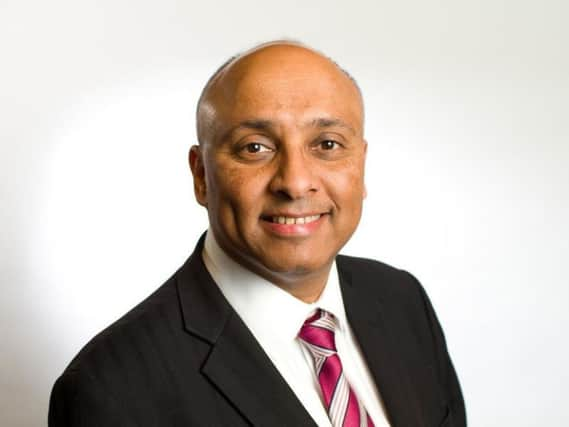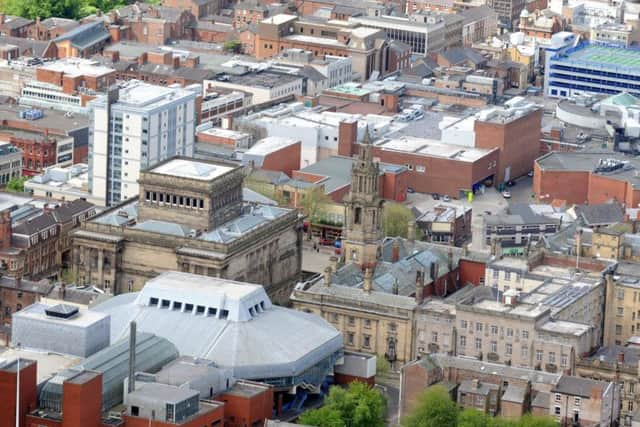MP: 'It’s all very well saying the Preston Model is bringing in millions - that is not quite the reality'


Sir Mark urged Preston City Council chiefs to “get a grip” and sort out the city’s future.
And the long-serving Labour MP delivered a withering assessment of Preston City Council’s much-vaunted Preston Model.
Advertisement
Hide AdAdvertisement
Hide AdMr Hendrick said talk of a booming city and the benefits of common wealth building under the so-called Preston Model did not reflect the true nature of the local economy.


The man who has represented Preston in Westminster for the past 19 years recently criticised the city’s main thoroughfare for having too many “charity shops, vaping stores, tattoo parlours and empty units”.
His remarks sparked a debate over what Preston can do to save its prime street from a lingering decline brought on by the growth of online shopping and increasing competition from out-of-town retail parks.
Sir Mark said he had spoken in the past to Preston City Council leader Matthew Brown but he did not believe that given the current state of retail in the city centre and collapse of the Guild Hall operation that everything was going well.
Advertisement
Hide AdAdvertisement
Hide AdNow he has written to the Lancashire Enterprise Partnership and other Lancashire MPs urging the county to come up with a retail strategy in conjunction with local councils.
He said: “It’s all very well saying that the Preston Model is bringing in millions of pounds into the city. That is not quite the reality that I see.
“I have many constituents coming to see me with problems with Universal Credit, mental health issues caused by economic stress, and money problems.
“There’s nobody supports this city and wants to do more for this city than me, but we can’t go around pretending everything is all right.”
Advertisement
Hide AdAdvertisement
Hide AdSir Mark added: “There are clearly issues – to their credit the council has tried to bring in more leisure via the Guild Hall but that has not gone well.
“What do we do now? The council needs a proper retail strategy. I am throwing down the gauntlet to the council to get a grip of this issue.”
“I have written to the Lancashire Enterprise Partnership because it covers the whole of Lancashire. Every town needs a retail strategy - Preston certainly needs one.”
In the Commons last week, Sir Mark spoke about the need for a retail strategy for Preston and other towns.
Advertisement
Hide AdAdvertisement
Hide AdHe said business rates, high rents, online shopping, and car parking costs for visitors were just some of the factors leading to problems in our high streets.
In his letter, Sir Mark said: “The Government Industrial Strategy did not mention in any detail a Retail Strategy for shops and businesses in town centres.
“The trade union Usdaw produced a report ‘Industrial Strategy for Retail’ on a way forward for town centres and retail strategy
“As the government is not paying anywhere near enough attention to retail, it is important that the County develops its own plans with local authorities given the decline in retail in recent years.”
Advertisement
Hide AdAdvertisement
Hide AdCoun Peter Moss, Deputy Leader and Cabinet Member of Planning and Regulations said: “We are committed to and passionate about the long-term success of Preston City Centre.
However while we appreciate the importance of retail, and have recently commissioned a Retail and Leisure report, we do not believe that a retail-only focus is the right approach. This is why in addition to working closely with the Business Improvement District to support the high street, we are taking a holistic approach.
“We continue to invest heavily in culture through the iconic Harris and diverse events programme. Similarly we are committed to attracting people into the city centre through Preston Markets, the cinema development and a variety of place-making activities. Also intrinsic to the city centre’s future is the recently launched Stoneygate Masterplan, which complements and furthers the City Living Strategy.
“We welcome dialogue and support from the Lancashire Enterprise Partnership and other partners in ensuring a bright future for the city centre.”
Advertisement
Hide AdAdvertisement
Hide AdDespite alternative opinions having been expressed Preston continues to outperform the region in terms of retail, this has been evidenced by senior retail managers in the city centre.
Mark Whittle, manager of Preston Business Improvement District, said: “We have said time and time again, and it’s a well known fact, people shop differently now than they used to. Whilst the retail offer remains strong, we are keen to see new brands locate here, and current retailers invest and expand.
“For that to happen they need to be supported, welcomed and suitable premises need to be available.Business rates is a major deterrent to investment and the BID, via it’s host the NWL Chamber of Commerce, continue to push for reform on this issue.
“To remain a destination of choice we have to create additional reasons to visit the city centre – this includes making sure the city is accessible, welcoming, clean and animated. All stakeholders have a part to play in securing the future of retail, but there is a wider point, and that is that the retail economy relies on many factors for success.
Advertisement
Hide AdAdvertisement
Hide Ad“The city would be well placed to encourage greater investment from companies employing significant numbers – their workforce would naturally support the city and would spend time and money there. Further, we need to move along our strategy for good quality city centre living – people residing in the city centre would, by nature, buy locally.
“The Government has launched significant funds for high street improvements, sadly Preston was not successful in the latest round of bidding. The BID continues to work collaboratively with the public and private sector in seeking support and funding to improve Preston’s appeal ensuring we remain the destination of choice for shopping in Lancashire.”
A spokesperson for the Lancashire Enterprise Partnership (LEP) added: “The LEP supports all sections of the Lancashire economy and is very aware of the challenges faced by our high streets and our retailers, not only in Preston but in conurbations across the county. The retail economy, and the changing nature of our town and city centres, will be considered carefully in our evolving Local Industrial Strategy and the Greater Lancashire Plan, currently being developed by all 15 Lancashire local authorities. The LEP is also supporting local authorities looking to access the Future High Street Fund and the Heritage Action Zone Fund, and within the first wave of Future High Street Fund applications four Lancashire towns have been invited to proceed to the second round.”
Value of the ‘Preston Model’
Preston’s community wealth building scheme is worth an estimated £488m to the wider Lancashire economy.
Advertisement
Hide AdAdvertisement
Hide AdThe so-called ‘Preston Model’ has been hailed as a ‘beacon’ for other cities by thinktank Centre for Local Economic Strategies (CLES).
The CLES says the model - which involves awarding key contracts to local firms where possible - has led to procurement worth £112m to Preston itself.
Guild Hall needs new operator
Preston Guild Hall was bought by businessman Simon Rigby for just £1 in 2014.
He spent millions on transforming the Guild Hall - but weeks ago his operating company Preston Guild Hall Ltd went into administration.
Advertisement
Hide AdAdvertisement
Hide AdMeanwhile Preston City Council has taken back control of the building, on which it owns the lease.
A new operator for the venue is now being sought.
Worst June shopping footfall for seven years
Shoppers turned away from UK high streets in droves last month, as footfall plummeted to its worst June figures for seven years.
Footfall at UK shopping hubs dived as they failed to attract visitors amid gloomy June weather, according to the BRC-Springboard footfall monitor.
Footfall across shopping across shopping areas fell by 2.9 per cent for the month, as the retail downturn accelerated from 0.9 per cent decline in the same month last year.
The high street was particularly badly affected, with visits sliding by 4.5 per cent compared to a 0.1 per cent increase in June 2018 which had benefited from the Men’s World Cup and sunny weather.